Oct 2021 Newsletter: Toxic Car Seats & Advising John Oliver on PFAS
Hello!
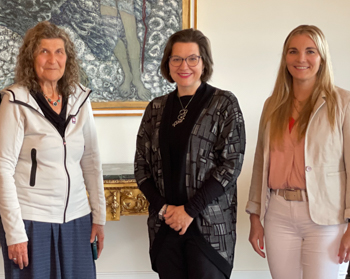 Arlene with Iceland’s first lady Eliza Reid and leading mountaineer Villa Arna During my recent visit to Iceland, I enjoyed mountain hikes with Villa Arna, the first woman to ski solo to the South Pole and climb the highest peaks on all seven continents. Villa introduced me to Eliza Reid, the first lady of Iceland, and other Icelandic leaders who are now interested in phasing out PFAS from food packaging, outdoor apparel, and other products. My new friends and I are continuing with virtual meetings to discuss strategies to reduce the use of PFAS in Iceland. Fortunately, the issue of PFAS in products just got the John Oliver treatment. I was honored to act as an advisor for the recent excellent program about PFAS on Last Week Tonight. We are delighted that our paper on PFAS as a Class was shown and, as I had suggested to his producers, John strongly advocated for managing all PFAS as one chemical class. If you missed it, you can watch this entertaining segment on YouTube. 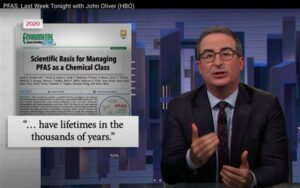 PFAS featured on Last Week Tonight with John Oliver Unfortunately, the problem of harmful flame retardants being added to children’s and other products continues to rear its ugly head, decades after my research helped remove these toxics from baby pajamas in the 1970s.  Organophosphate esters pose a larger risk to children’s brain development than previously thought Our new paper in Environmental Health Perspectives found that organophosphate esters, increasingly used as flame retardants and plasticizers in car seats and other children’s products, cars, electronics, furniture, and building products may harm IQ, attention, and memory in children in ways not yet considered by regulators. These chemicals are being used as replacements for organohalogen flame retardants under the incorrect assumption that they’re safe. Our paper concludes with a call to end all nonessential uses of organophosphate esters. During these challenging times, I look for hope and inspiration wherever I can find it. So I recently subscribed to Letters from an American, a free daily newsletter from historian Heather Cox Richardson. Her messages help me understand the present with perspectives from the past. For example, her Labor Day message tells the remarkable story of Frances Perkins, an advocate who, inspired by tragedy, tirelessly fought for— and won—protections for workers in the early 20th century. “Frances Perkins… transformed the horror of the Triangle Shirtwaist Fire into the heart of our nation’s basic social safety net.” 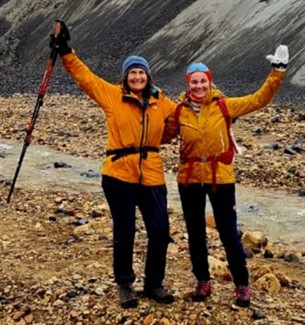 Arlene and Villa in the highlands of Iceland, September 2021 Following on my recent Iceland vacation, I am planning a cross country ski vacation in the remote and beautiful Methow Valley in Northern Washington State from about December 17 to 26. I’m planning to stay at the Mazama Country Inn on the system of more than 100 miles of ski trails. Get in touch if you might like to join part of this ski holiday. And for some family news, I am very proud to share that my daughter Annalise has been appointed by the Biden-Harris Administration to serve as a Senior Advisor for Climate at the Pentagon. Warm regards, P.S. Both the Green Science Policy Institute and I personally are looking for administrative help. The Institute needs an administrative professional in our North Berkeley office half time or more every day. Separately, I need someone to manage my small Annapurna book and t-shirt business and other admin help for several hours each week. Contact me to apply. |
Our NYT Op-ed: Fossil Fuels, Plastics, & Toxic Chemicals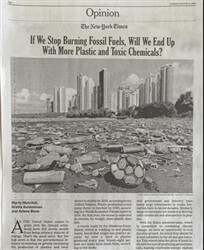 Read our New York Times op-ed above Gretta Goldenman, our Institute’s board chair, Marty Mulvihill, of Safer Made and our Advisory Board, and I were delighted to have had our recent Opinion piece published in The New York Times. In it, we explain how the petrochemical industry is currently pivoting to increased production of plastics and toxic chemicals to make up for declining fuel sales. We argue that the interrelated challenges of climate, plastic pollution, and chemical toxicity must be solved together. If we focus on only a single metric, like greenhouse gas emissions, we may encourage a shift from fuel to plastics and toxic chemicals. Our conclusion: You can read the full Op-Ed in The New York Times or The Star Tribune. |
Managing PFAS as a Class: Best Paper Award & Videoby Carol Kwiatkowski 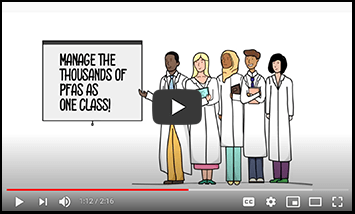 Watch our new video on PFAS as a class Great news! Our peer-reviewed paper, Scientific Basis for Managing PFAS as a Chemical Class, was one of five winners of the 2020 Environmental Science & Technology Letters Best Paper Award. Perhaps no surprise, it was co-authored by 16 international PFAS experts. Also, not a surprise, the other winning papers all addressed the COVID-19 pandemic. You can read about all five papers in this commentary by the journal. Please check out our new two-minute animated video, based on the paper, which explains the importance of a class-based approach to PFAS management. There are many thousand of these highly persistent chemicals — too many for governments and businesses to follow the old approach of addressing PFAS one chemical at a time. We must eliminate non-essential uses of all PFAS and finding safer alternatives for currently essential uses. Please spread the word by sharing this new video on listservs and social media. A great introduction for your friends and family! |
Can You Avoid PFAS in Makeup?by Amit Rosner and Seth Rojello Fernández The Institute’s recent study with Notre Dame and Indiana Universities finding indicators of potentially harmful PFAS in more than half of makeup products tested—most of it unlabeled—received widespread media attention. Now makeup wearers across North America are asking us: How can I avoid PFAS in my cosmetics? 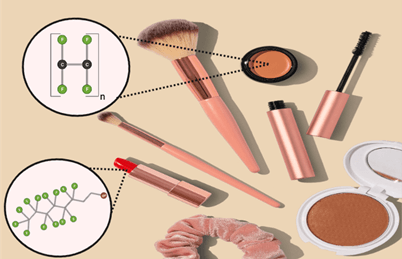 PFAS were particularly common in liquid lipstick, foundation, and waterproof mascara We try to answer this complicated question in this blog post: (1) Use tools like Clearya to avoid labeled PFAS. The study found that PFAS use in cosmetics is often unlabeled, but some products do include them on the label. Clearya is a free browser plug-in and mobile app that works automatically while consumers are shopping online and notifies the user of unsafe chemicals it detects on labels, including PFAS. Other tools such as the Institute’s PFAS-Free List and EWG’s Skin Deep are also helpful. (2) Support the No PFAS in Cosmetics Act. The bipartisan No PFAS in Cosmetics Act introduced in the House and Senate would ban all PFAS from makeup and other personal care products. Breast Cancer Action has a simple form so you can ask your representatives to support these important bills. (3) Ask your favorite brands for PFAS-free products. You can ask your favorite beauty brands to publicly commit to not using PFAS by tweeting or emailing them (look for a “Contact Us” page on their website). |
Could There be PFAS in Your Carpet? What Can You Do?by Jonas LaPier  Older carpets may contain PFAS The good news is that as of 2020 most new US carpets and rugs are free of PFAS treatments. The bad news is that if you have an older carpet, it could be treated with these potentially toxic forever chemicals. Even those with eco-labels such as Green Label Plus may contain PFAS. What can you do to reduce harm if removing and replacing the carpet is not an option for you? Reducing household dust is the best way to minimize your family’s (and your pets’) PFAS exposure. We recommend frequent and thorough vacuuming of all carpets and other flooring as well as wet mopping and wet dusting of surfaces. This will also reduce your exposure to flame retardants, lead and other harmful chemicals. A vacuum with a HEPA filter and a mechanical power head (think a spinning brush) is most effective. Thorough hand washing is especially important before eating, after cleaning, and for children after playing on the floor. Placing a playmat or rug over PFAS treated carpet may also help. Avoiding products containing PFAS–often advertised as high performance, stain or water proof–will also help reduce your overall exposure. You can check out our PFAS-Free Page for lists of safer products without any PFAS. |
CalendarOct 12, 2021 at 9am Pacific: Co-hosted by our Institute, mindful MATERIALS, and Healthy Building Network, green building experts and researchers will discuss the health and environmental concerns of unnecessary antimicrobials in building materials. This is especially timely as the COVID-19 pandemic has increased pressure on manufacturers to add antimicrobials to their products. Speakers from the healthcare sector and industry have been invited to present their take on this often confusing topic. Attendees will also be invited to submit their own questions for further discussion. Register here. October 19, 2021 at 10am Pacific: This free webinar will update purchasers and designers in healthcare, government, private business, hospitality, and education on changes in furniture flammability standards. You will learn about the new regulations, new ways to identify and purchase healthier furniture, and concerning efforts that threaten our progress towards fire-safe and healthier interiors. You are invited to register here. October 21, 2021 at 1pm Pacific: This webinar hosted by the UCSF EaRTH Center will help environmental health scientists learn to use the media to reach the public and policymakers. It will feature presentations by the Institute’s science communications officer Rebecca Fuoco, UCSF’s Laura Kurtzman, and Susan Lamontagne of Public Interest Media Group, Inc. Register here. |